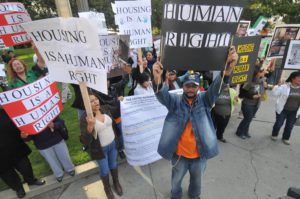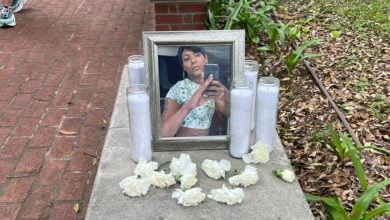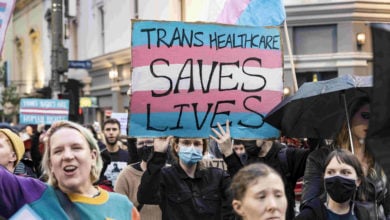
“Every single day we have new young people show up at our doors,” Kerbie Joseph, a counselor at a shelter for LGBTQ youth in New York City, told Liberation. “They are fleeing abuse or have been kicked out of their homes—just because they’re LGBTQ. They’re dealing with serious trauma and many have considered suicide. The problem is huge, but it rarely gets discussed—and we only have 90 beds.”
Nationwide, nearly half of all the homeless youth are LGBTQ. Other studies have found that there are up to 400,000 LGBTQ minors living in the streets across the country.
Even at their young age, many have already experienced a lifetime of challenges: harassment and bullying, sexual abuse and violence, and family rejection. They are left to fend for themselves in a society where discrimination and bigotry are rampant, and in which neither food, housing or jobs are provided as rights. According to the Ali Forney Center in New York, “more than 50 percent of homeless youth are propositioned for sex in exchange for food, shelter or money within 72 hours of being homeless.”
The disgraceful reality facing LGBTQ youth has nothing to do with lack of resources. Despite the vast wealth in the country, and the huge number of empty homes, there is pitifully little government support for the over 3 million people experiencing homelessness annually.
In fact, LGBTQ youth services were cut significantly in the austerity budget agreed to by the Obama administration and the Republican-controlled Congress in 2013, which has worsened the problem.
Capitalism and the family
For thousands of years, humans lived under communal arrangements in which the raising of children and the survival of everyone was considered a collective responsibility.
Under the capitalist system, by contrast, workers have to sell their labor to employers to get back wages needed to pay for food, rent and basic survival. The system benefits not just from labor on the job, but also the tremendous amount of unpaid domestic labor that goes into maintaining the working class—from raising the next generation of workers to caring for one’s elder relatives. The nuclear family—based on a couple and their dependent children—is the economic unit that emerged historically to serve these tasks once communal arrangements were overthrown.
Today wages are so low, and the cost of living is so high, that it is practically impossible for any worker, apart from the very well paid, to live independently.
Families are often examples of love and solidarity. But as LGBTQ homelessness shows, the nuclear family can also be a source of oppression. Because it is a unit based on economic dependence, the dependents are subject to the power of the “providers,” which can take abusive forms. Once a dependent is cast out of that unit, it threatens their very survival.
Because of the LGBTQ liberation struggle, society has experienced huge advances in the acceptance, and embrace, of sexual and gender diversity. But the corporate media, the schools and religious institutions continue to transmit centuries of “traditional thinking,” in reality the oppressive ideologies of the ruling class. This infects even poor and working-class people who have nothing to gain from them, and results in one of the worst features of anti-LGBTQ oppression—family rejection and disownment.
Socialism means a home is a guaranteed right
This tragic situation—and the plight of all homeless people—could be resolved essentially overnight. There are approximately six empty homes for every homeless person in the United States.
The problem is that the landlords and the banks own and control the vast majority of the housing stock, although they did not build it. They are allowed to charge whatever they want—even if it means people will be forced to sleep in the streets.
The socialist solution is simple: End the dictatorship of the billionaire class. Take away the property of the banks and distribute it to the homeless. All we would need to do is pass out keys. Socialism makes housing, a job and other necessities guaranteed rights, so there is no dependence on the nuclear family, and the whims of individuals, for anyone’s survival.
The traumatic phenomenon of homelessness, along with the additional economic hardships facing LGBTQ people, will be relegated to memories of an unjust past.






